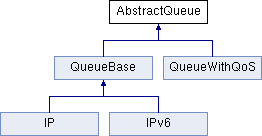#include <AbstractQueue.h>

Public Member Functions | |
| AbstractQueue () | |
| virtual | ~AbstractQueue () |
Protected Member Functions | |
| virtual void | initialize () |
| virtual void | handleMessage (cMessage *msg) |
| virtual void | arrival (cPacket *msg)=0 |
| virtual cPacket * | arrivalWhenIdle (cPacket *msg)=0 |
| virtual simtime_t | startService (cPacket *msg)=0 |
| virtual void | endService (cPacket *msg)=0 |
Protected Attributes | |
| cPacketQueue | queue |
Private Member Functions | |
| void | doStartService () |
| void | doEndService () |
Private Attributes | |
| cPacket * | msgServiced |
| cMessage * | endServiceMsg |
Detailed Description
Abstract base class for single-server queues. Contains special optimization for zero service time (i.e. it does not schedule the endService timer then).
Definition at line 30 of file AbstractQueue.h.
Constructor & Destructor Documentation
| AbstractQueue::AbstractQueue | ( | ) |
Definition at line 23 of file AbstractQueue.cc.
{
msgServiced = NULL;
endServiceMsg = NULL;
}
| AbstractQueue::~AbstractQueue | ( | ) | [virtual] |
Definition at line 29 of file AbstractQueue.cc.
{
delete msgServiced;
cancelAndDelete(endServiceMsg);
}
Member Function Documentation
| virtual void AbstractQueue::arrival | ( | cPacket * | msg | ) | [protected, pure virtual] |
Functions to (re)define behaviour Called when a message arrives at the module. The method should either enqueue this message (usual behaviour), or discard it. It may also wrap the it into another message, and insert that one in the queue.
Most straightforward implementation: queue.insert(msg);
Implemented in QueueBase, and QueueWithQoS.
Referenced by handleMessage().
| virtual cPacket* AbstractQueue::arrivalWhenIdle | ( | cPacket * | msg | ) | [protected, pure virtual] |
Called when a message arrives at the module when the queue is empty. The message doesn't need to be enqueued in this case, it can start service immmediately. This method may:
- simply return the the same pointer (usual behaviour), or
- discard the message and return NULL pointer (the effect being this message being ignored)
- or modify the message, wrap in into another message etc, and return the (new) message's pointer.
Most straightforward implementation: return msg;
Implemented in QueueBase, and QueueWithQoS.
Referenced by handleMessage().
| void AbstractQueue::doEndService | ( | ) | [private] |
Definition at line 73 of file AbstractQueue.cc.
Referenced by doStartService(), and handleMessage().
{
endService( msgServiced );
if (queue.empty())
{
msgServiced = NULL;
}
else
{
msgServiced = queue.pop();
doStartService();
}
}
| void AbstractQueue::doStartService | ( | ) | [private] |
Definition at line 64 of file AbstractQueue.cc.
Referenced by doEndService(), and handleMessage().
{
simtime_t serviceTime = startService( msgServiced );
if (serviceTime != 0)
scheduleAt( simTime()+serviceTime, endServiceMsg );
else
doEndService();
}
| virtual void AbstractQueue::endService | ( | cPacket * | msg | ) | [protected, pure virtual] |
Called when a message completes service. The function may send it to another module, discard it, or in general do anything with it.
Most straightforward implementation: send(msg,"out");
Referenced by doEndService().
| void AbstractQueue::handleMessage | ( | cMessage * | msg | ) | [protected, virtual] |
Definition at line 42 of file AbstractQueue.cc.
{
if (msg==endServiceMsg)
{
doEndService();
}
else if (!msgServiced)
{
cPacket *msg2 = arrivalWhenIdle( PK(msg) );
if (msg2)
{
msgServiced = msg2;
doStartService();
}
}
else
{
arrival( PK(msg) );
}
}
| void AbstractQueue::initialize | ( | ) | [protected, virtual] |
Reimplemented in QueueBase, QueueWithQoS, IP, and IPv6.
Definition at line 35 of file AbstractQueue.cc.
{
msgServiced = NULL;
endServiceMsg = new cMessage("end-service");
queue.setName("queue");
}
| virtual simtime_t AbstractQueue::startService | ( | cPacket * | msg | ) | [protected, pure virtual] |
Called when a message starts service, and should return the service time.
Example implementation: return 1.0;
Implemented in QueueBase, and QueueWithQoS.
Referenced by doStartService().
Member Data Documentation
cMessage* AbstractQueue::endServiceMsg [private] |
Definition at line 38 of file AbstractQueue.h.
Referenced by AbstractQueue(), doStartService(), handleMessage(), initialize(), and ~AbstractQueue().
cPacket* AbstractQueue::msgServiced [private] |
Definition at line 37 of file AbstractQueue.h.
Referenced by AbstractQueue(), doEndService(), doStartService(), handleMessage(), initialize(), and ~AbstractQueue().
cPacketQueue AbstractQueue::queue [protected] |
The queue.
Definition at line 48 of file AbstractQueue.h.
Referenced by QueueWithQoS::arrival(), QueueBase::arrival(), doEndService(), and initialize().
The documentation for this class was generated from the following files:
Generated on Tue Jun 7 2011 14:22:43 for INET Framework for OMNeT++/OMNEST by
 1.7.1
1.7.1